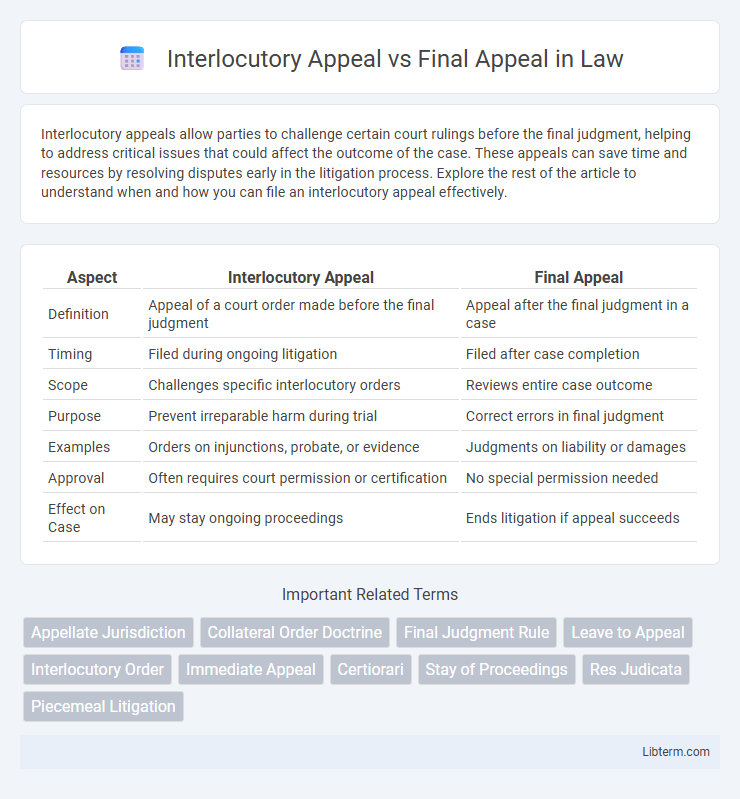Interlocutory appeals allow parties to challenge certain court rulings before the final judgment, helping to address critical issues that could affect the outcome of the case. These appeals can save time and resources by resolving disputes early in the litigation process. Explore the rest of the article to understand when and how you can file an interlocutory appeal effectively.
Table of Comparison
| Aspect | Interlocutory Appeal | Final Appeal |
|---|---|---|
| Definition | Appeal of a court order made before the final judgment | Appeal after the final judgment in a case |
| Timing | Filed during ongoing litigation | Filed after case completion |
| Scope | Challenges specific interlocutory orders | Reviews entire case outcome |
| Purpose | Prevent irreparable harm during trial | Correct errors in final judgment |
| Examples | Orders on injunctions, probate, or evidence | Judgments on liability or damages |
| Approval | Often requires court permission or certification | No special permission needed |
| Effect on Case | May stay ongoing proceedings | Ends litigation if appeal succeeds |
Introduction to Appellate Processes
Interlocutory appeals involve challenges to trial court decisions made before the final judgment, allowing parties to address specific legal errors early in the appellate process. Final appeals occur after the trial court renders a complete judgment, enabling comprehensive review of both procedural and substantive issues. Understanding the distinction between interlocutory and final appeals is crucial for navigating appellate jurisdiction and strategic litigation decisions.
Defining Interlocutory Appeals
Interlocutory appeals are legal challenges filed before the trial court's final judgment, targeting specific rulings that may significantly affect the case outcome. These appeals aim to address urgent issues that cannot wait for the conclusion of the entire trial, thereby preventing potential miscarriages of justice. Unlike final appeals, interlocutory appeals do not encompass the whole case but focus on discrete legal questions decided during the litigation process.
Understanding Final Appeals
Final appeals review decisions that conclusively resolve all issues in a case, allowing courts to issue binding judgments enforceable by law. These appeals focus on the entire scope of the trial court's judgment rather than specific rulings, providing a comprehensive evaluation of legal or procedural errors. Courts generally prioritize final appeals to promote judicial efficiency and avoid piecemeal litigation.
Key Differences Between Interlocutory and Final Appeals
Interlocutory appeals address rulings made during the course of a case, focusing on specific legal issues before the final judgment, while final appeals review the entire case after a complete trial and final decision. Interlocutory appeals are typically limited in scope and aim to resolve urgent questions that could affect the trial's outcome, whereas final appeals consider all aspects of the case, including facts and legal interpretations. The timing and scope distinguish interlocutory appeals by their immediate intervention purpose, contrasting with final appeals that provide comprehensive review post-judgment.
Legal Basis for Interlocutory Appeals
Interlocutory appeals are governed by specific legal provisions that allow immediate review of certain trial court orders before the final judgment, typically found in statutes or procedural rules such as 28 U.S.C. SS 1292(b) in the federal system. These appeals are limited to distinct circumstances where delaying review until final judgment would cause irreparable harm or render the appeal ineffective, ensuring efficient judicial process. By contrast, final appeals generally arise only after the conclusion of litigation, challenging the overall judgment rather than intermediate rulings.
Requirements for Filing a Final Appeal
Filing a final appeal requires the prior issuance of a final judgment or a final order from a trial court, which conclusively resolves the main controversy in the case. The appeal must be filed within the prescribed period, typically 30 days from notice of the final decision, adhering to procedural rules such as submitting the notice of appeal and payment of docket fees. Unlike interlocutory appeals, which address preliminary or non-final rulings, final appeals demand the presence of a decision that terminates the litigation on the merits, ensuring the appellate court reviews a fully adjudicated case.
When Can Interlocutory Appeals Be Filed?
Interlocutory appeals can be filed during the course of ongoing litigation when a party seeks immediate review of a trial court's ruling on a preliminary or non-final issue that could significantly affect the case's outcome. Common examples include orders related to injunctions, class certification, or decisions that may cause irreparable harm if delayed until the final judgment. Courts typically allow interlocutory appeals only when delaying review until the final appeal would render the appellate remedy ineffective or when a statute expressly permits such appeals.
Common Scenarios for Final Appeals
Final appeals typically arise in cases involving final judgments or orders that conclusively resolve the main issues in a lawsuit, such as verdicts in civil trials, criminal convictions, or dismissal of entire claims. Common scenarios for final appeals include adverse rulings on liability, sentencing decisions in criminal cases, and decisions granting or denying motions for summary judgment. These appeals seek to review the entire case record to determine if legal errors affected the trial outcome or if the judgment was supported by sufficient evidence.
Advantages and Disadvantages of Each Appeal Type
Interlocutory appeals allow parties to challenge court rulings before the final judgment, providing early resolution of critical issues but often causing delays and increased litigation costs. Final appeals address decisions only after a case's conclusion, ensuring comprehensive review but potentially prolonging the overall dispute resolution process. Interlocutory appeals benefit from immediate error correction, while final appeals reduce piecemeal litigation and conserve judicial resources.
Conclusion: Choosing the Right Appeal Path
Selecting the appropriate appeal path hinges on understanding that interlocutory appeals target specific trial court rulings before case resolution, while final appeals address judgments after case completion. Interlocutory appeals expedite review of urgent or controlling issues, potentially preventing unnecessary litigation costs or errors. Final appeals offer comprehensive scrutiny of the entire case outcome, ensuring thorough judicial review and consistent application of law.
Interlocutory Appeal Infographic

 libterm.com
libterm.com